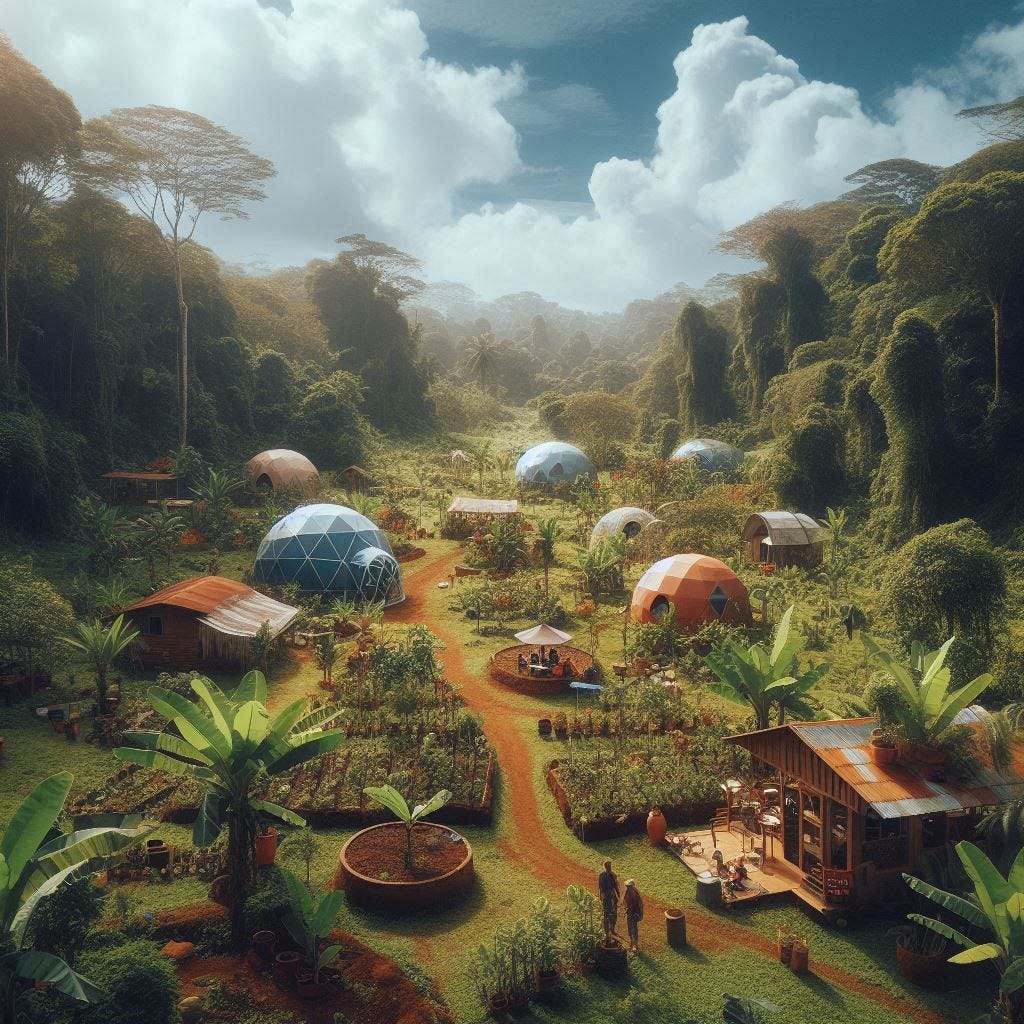Below is an essay I wrote for the Consciousness Explorers Club (CEC), a pluralistic meditation group I’ve been involved with for the past decade. It was founded by my good bud Jeff Warren, who has his own fantastic Substack where he creates weekly guided meditations, and also an amazing Podcast, where him and Tasha have weekly guests on to guide and discuss various types of mind-body practices.
The CEC is a non-profit and meditation collective that mainly gathers around the Monday night online zoom meditations. It’s a wonderfully inviting community featuring diverse voices and offerings. We have a unique theme each month that the newsletter and Monday night sits more or less reflect (I’ll be leading the meditation on July 8th). This month’s theme is freedom, hence the essay below. If this sounds like your jam, be sure to sign up for the newsletter and check the website for offerings.
When I’m asked about what I’ve gotten out of my meditation and mindfulness practice, one of the first things that comes to mind is a sense of freedom.
But not the type of freedom you might think.
As a kid, I used to imagine what kind of life I had ahead of me. Full of travel and adventure; Success in business, academics, and romantic relationships. The world felt full of mystery and possibility, and I wanted it all.
When I fell in love with skateboarding my dream morphed into becoming a pro skater in San Francisco, which was at that time the mecca of skateboarding. My first reality check came when I realized that although I was one of the best skaters in my small town, I was nowhere near good enough to compete with the real talents.
Growing up, I was hit with reality after reality. Although a smart kid, my ADHD kept me from really applying myself at school, and my dream of becoming a celebrated academic also fell away. (Meditation for ADHD video, and How I Overcame My ADHD video)
In my early 20s I started studying Tibetan Buddhism formally, hoping to experience the profound transformation these traditions promised. But traditional Buddhist study didn’t resonate like I hoped it would, and the Buddhist group itself was not the enlightened community I had hoped for, but instead full of unhealthy dynamics that eventually led to its demise.
But as each hope for my future fell away, a new one was born. Sometimes a little grand, sometimes more realistic and humble; I always had some future ideal I wanted to work towards, an image in my head that I thought, if achieved, would bring me real happiness and fulfillment.
And I don’t think this is a bad thing. Psychological studies show that we are typically happier if we have goals to work towards. Without meaningful challenges, we have a tendency to become depressed. Having goals that truly matter gives us direction and helps overcome hardship. They make us resilient. They are grounding and orienting, imbuing a sense of purpose into our lives. This is in fact the basis of Existential Psychology.
Two of my guiding ambitions have been around career and relationships. I wanted to be successful in the work I love doing, and I also wanted a loving partnership. I could envision the happiness and fulfillment these things would bring me.
But then I started to get these things. And it didn’t feel at all like I expected.
I’ve now had a few versions of career success, all of which I had previously dreamt of. In my early 30s I got a job writing meditations for Calm, one of the most popular meditation apps of the time (but nowhere near as popular as it is now). That was amazing, but after a few months the excitement wore off and I lost my inspiration. I realized writing meditations in front of a computer screen was pretty isolating, and I craved more connection in my work.
I was also studying psychotherapy, and when I began seeing clients I felt that connection to a real person that I had long craved for in my work. It was amazing to see my impact, to have these intimate moments with others, supporting them in their process.
While I still love this work, it’s never quite brought me the fulfillment I had imagined. There was still a craving for more, more space to express myself.
Starting my YouTube channel and Substack gave me these outlets, and I imagined that if I could impact enough people through these mediums, I would finally have that fulfillment I had long desired. And while I do love to hear from people who have been impacted by my work, that feeling doesn’t satisfy like I hoped it would.
So then I started to imagine the things that may bring some real satisfaction to my life. Maybe hosting transformative retreats? But realistically I know I’d have a high on the retreat that would quickly fade after it ended.
OK, maybe start or join a community where we can all be in continual intimate reciprocal relationship with each other and a natural world? But having actually lived in these types of communities, I knew that living so close in a small group brings about its own problems and complex dynamics that need continual processing and upkeep to maintain harmony…
But maybe if I meet the right person, the perfect partner for me, who really gets me, who is beautiful and funny and smart and challenges me in all the right ways but also loves me unconditionally and would do anything for me and gently holds me and sings to me when I’m sad and will even watch skate videos with me on YouTube…
And while I imagine THAT will surely bring me the fulfillment I have always been seeking, I actually know that relationships are more complicated than that, and won’t bring me the everlasting fulfillment I imagine it would.
Don’t get me wrong. I’m not saying we shouldn’t have dreams, goals, and ambitions. I do in fact think these things are helpful in many ways. What I’m saying is we shouldn’t put all our stock in some future idea of happiness, sacrificing each day in the name of some imagined future.
When I imagine these scenarios and how happy I will feel at some future date, I’m no longer present. I’m lost in my imagination. And when I do come back here, it feels so hollow and empty compared to that idyllic fantasy.
They say comparison is the thief of joy. And when we lose ourselves in our hopes and dreams for the future, we inevitably compare those imagined ideals against this moment, right now.
Even though I am not fulfilled in this moment like I want to be, even though I can imagine so many things that would make my life better, I can still appreciate this moment right now. I can be grateful for what I do have and see the beauty in my friendships, in the flowers I admire on my daily walks, in the little moments of quiet and calm.
My meditation and mindfulness practice has given me this freedom from the idea that I need some perfect thing in the future to be happy. I still want to have more impact on the world, I still want to live somewhere beautiful surrounded by people I love, I still want that partner that really gets me… but I no longer let these things distract me from the beauty of today.
I practice being here, now. When I wash dishes, I don’t rush or resent the process because there’s something more enjoyable to do later; I clean every plate as though it really matters. Because it does matter. And somehow I’ve even learned to genuinely enjoy washing dishes; something I never would have thought possible.
When you treat moments like they don’t matter, you’re setting up a hierarchy of what does and doesn’t matter, and this leads to an inevitable comparison. Meditation and mindfulness is about practicing each moment as an end unto itself. Not in service to a greater moment. Yes we wash dishes so we will have clean dishes, but that doesn’t mean we can’t also enjoy the dish washing process in itself.
We may meditate in hopes that it will lower our stress and anxiety in everyday life, but the practice of meditation is actually about learning to embrace this moment, right now, even if it’s uncomfortable, imperfect, or even painful.
It’s not about giving up on our dreams or ambitions. I still let myself fantasize about the future I’d like to create for myself, and let that inspire my work and actions in the right direction. But I’ve no longer fully bought into the belief that I need to achieve these things to be happy or have a meaningful life, or that today is any less significant than some future day.
The practice, for me, is seeing what ideas I’m attached to, seeing the impact it has on me in that moment, and coming back to presence, over and over; every time embracing the moment as whole heartedly as I can.
Learning to embrace each moment, whatever it is— is liberating. That’s why we practice. And that, to me, is real freedom.






Fantasy is almost always better than reality, but at least it keeps us going. I sometimes practice intentional limerence like a happy meditation.
We must aspire to honor what we once held and who we once were, strive to appreciate where we are now and who we are at present, and also dare to remain open to what lies ahead and who we may become.